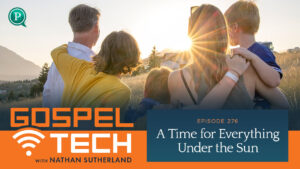Today we discuss how to make space for people in episode two of our Summer Session series. The question: How can we be intentional this week about including the people God has planted us near?
We’ll discuss three great listens for the week, an helpful and encouraging book, and root our conversation in Matthew 13:31 and Acts 1:8: God casts us unto gardens to see His Kingdom grow, and he empowers us for this work by his Holy Spirit. We’re not saved from the world, we’re saved for it.
Show Notes:
Roblox
Tim Keller: The Gospel and Life Podcast Series
John Mark Comer Book: The Ruthless Elimination of Hurry
Rosaria Butterfield book: The Gospel Comes with a House Key
Ways to listen:
🔗 click the link in the profile
🎧 search Gospel Tech in your favorite streaming service (iTunes, Amazon)
Transcription:
Heavenly Father, thank you for this opportunity to talk about technology and the gospel. Lord, would you give me wisdom to speak? Would you give all of us ears to hear and hearts with which to apply the truths that you have for us when it comes to making space in our calendars for the people you’ve planted us near? In your name, amen. Hello everyone and welcome to the Gospel Tech podcast. My name is Nathan Sutherland and this podcast is dedicated to helping families love God and use tech. Today, we are continuing our conversation about the summer session focus, these shorter episodes on something applicable, where we can try to practice some of what we’ve learned with Gospel Tech and with the gospel specifically of how do we apply this idea that God saved sinners and as saved sinners, which we call saints in biblical context, what do we do?
Today, we’re talking about making space for people. This idea that as we go through our summers, we have a different rhythm, we have a different cadence. Oftentimes, that doesn’t mean more free time, it certainly means more discretionary time many times, but how do we decide to spend that time is really the question I want to dig down into and this idea that in light of the gospel, we do need to be intentional with our free time. None of it’s actually free, and that’s kind of our conversation for today, is how do we live from the hope of that rather than just constantly feeling like we’re not doing enough or we should be doing more or even feeling guilty for doing something that’s amazing, like taking a family trip or just enjoying a day alone with the family. Those are great things. How do we then make space for people? And all of that, that’s today’s conversation, so I hope it’s challenging and encouraging. And with no further ado, let’s get this conversation started.
Welcome to the Gospel Tech Podcast, a resource for parents who feel overwhelmed and outpaced as they raise healthy youth in a tech world. As an educator, parent and tech user, I want to equip parents with the tools, resources, and confidence they need to raise kids who love God and use tech.
Thank you to everyone who’s helped make this podcast possible. Thank you for listening, for liking, for subscribing so you don’t miss any new content and for supporting us. We are a 501(c)(3) nonprofit, so thank you for going to gospeltech.net, click on that donate button and being a part of this ministry. We have our big fundraiser coming up in August and that is a huge deal for us because we raise a massive portion of our annual budget is the word I was looking for in that, whoa, words. And it has been an amazing blessing. We started this nonprofit, Anna and I, seven years ago and in that time… Four years ago? Five years ago, this will be our fifth annual fundraiser.
I literally stood up in front of people and I was like, “Hey, we thought we were going to just be a for-profit speaking organization. And we really have this heart to reach families in the public sphere, so the pre-believing groups where I get to go and do assemblies specifically on hope and choices, and we have this idea to do something with the gospel and technology. Will you support us?” And people came and they gave and it was amazing and super intimidating. And each year, it’s been more intimidating because while the Lord is doing amazing work, there is this weight of people supporting you. And so I’m so thankful to say that your support has helped us do this ministry. We have some really cool projects we’re excited to. Now, it’s coming up here in the fall, so it won’t happen in summer, but coming September, October, we’ll announce a couple projects that are coming because of support of individuals like yourselves.
And as this fundraiser comes, please be praying for us, be praying that the Lord provides the financial needs as he has and that we have the opportunity to step through open doors that the Lord provides. So that’s kind of a quick state of the union on the financial side. Thank you for being on this journey with us. Today, conversation about making space for people. Last week, just talked about how do we make space for the Holy Spirit? How do we listen to the Holy Spirit intentionally and make our hearts quiet and listen to what the Lord is saying to us, set in our minds on the things of the spirit, not on the things of the flesh. Well, today, we’re talking about making space for people and I’m going to follow a similar format. First three, I guess, podcasts. There is all podcasts today, three podcasts to listen to and the first isn’t specifically about making space for people, but it is really important and I’ve mentioned a couple talks but I just want to mention it here.
So how I built this is a great series of podcasts and while I know many of my entrepreneurial friends listen to this to get motivated, to put their nose to the grind zone and go out and learn how to make great organizations, the premise of the podcast… I should say this first, the premise of the podcast is Guy Raz of NPR interviewing people who have made massive organizations, and it might be anything from Lululemon, to Dyson to any other organization that you might think of where these people have successfully built it up often bootstrapping these organizations out of their own pockets and with their own mortgaged houses and all this stuff, and eventually made successful businesses that they were able to walk away from and oftentimes sell, which is great, except almost every one of these is a cautionary tale.
Every one of them is… What would it be? Ecclesiastes. Every one of them is like, “Yeah, I started when I was 25 and now I’m 65 and I did all of these things to build my own kingdom and now, I’m not even a part of it anymore. Thanks for having me.” Listen to it. It is a wonderful reminder of what am I working for, and where is this going to go when I’m not here anymore? So that’s why I like it. Very good. It’s specifically episode 438, August 15th, 2022, and it is the co-founder of Roblox. So it’s Guy, Baszucki. He gives this interview with Guy and specifically, there’s a little interaction with Guy’s son who’s 11 at the time of the interview. And it’s eye-opening. I get asked a lot, “What do you think about Minecraft? What do you think about Roblox? What do you think about any other video game?”
And Roblox has officially transferred into my no-fly zone when it comes to games kids should play because of this interview. Partway through the interview, actually towards the end, the 11 year old says, “Hey, how can you make Roblox feel safer because it doesn’t feel safe. You guys should do more.” And this individual responds with, “Yeah, we’re doing a pretty good job.” And at what he’s already explained is he knows that 75% of their user base is under the age of 15. He knows that in those minors that there are posts going up that could be problematic, and he knows that stopping them before posting them, so causing a delay so that they can be reviewed by real people before they are posted would be bad for business. That what’s important is turnover because they’re now a publicly traded company.
And it’s pretty tragic because when an 11-year-old, his core demographic of minors, says, “I don’t feel safe,” he basically says, “Yeah, but it’s good for business. So we’re willing to take that risk.” Which is fine when you’re selling objects to adults who know what they’re getting into, but not when you intentionally sell the product to kids and just don’t care that you’re selling them out for a little bit more income. So please listen to that one specifically. It’s eyeopening. It’s in his own words. I’m not putting words in his own mouth. It is, well, it’s enlightening, I’ll say that. So listen to that one.
But when it comes to being around people, I have loved Tim Keller’s, The Gospel and Life Podcast series. Tim Keller recently passed away, but they’re still posting his sermons and I’m currently going through the Real Jesus series. It’s four or five episodes, it’s from December 2022, starting with Who is the Real Jesus? And I always find Tim Keller encouraging because he’s accessible, he’s elucidating, he has breadth of knowledge and can get into the original text, which is something I cannot do, but it’s something that matters for daily parenting. It’s not just keeping head knowledge level. As someone who shares the gospel on a regular basis, that’s cool, but really as a parent, as someone who has to be able to take deep concepts of the Bible and then share them with four, seven and nine year olds, that’s my daily discipleship.
I love Tim Keller’s ability to break down big biblical concepts in meaningful ways and then make it so that I can do the same, that I can build a bridge to my kiddos’ understanding of God. So I strongly encourage that. If you haven’t listened, please do. And go back December of 2022 and there’s a great little miniseries there to start on. And then third, this is kind of a family one. We’re talking about making space for people. It’s very easy to listen to podcasts we like or listen to audiobooks that we enjoy, but what can we listen to with our kids? I’ve really enjoyed Circle Round. Anna actually found this one. It’s mostly just fairytales and folk tales and they are by and large, excellent. You are welcome to prep or preview them. They’re about 18 minutes, the whole thing’s 27, but there’s ads and stuff. So I skip the first minute to get right into the story, skip the minute of ads in the middle and then roll to the end.
And it gives you some application steps at the end if you want to have some conversation points or have your kids create a story of their own. They’re a lot of fun. They’re well done and we’ve only ever skipped one. And that was because there’s literally a guy making a deal with the devil, selling his soul for success, and it felt too close to home. We’ve got bible verses to help us understand that was kind of truths.
The fairy tales and folk tales are just fun and they’re good storytelling and help the kids be creative. So that’s one for making space. So three podcasts, one book. The book, I’m just going to give an honorary mention from last week’s book because The Ruthless Elimination of Hurry is awesome. Please read it. It was last week’s book. And the quote is, which is tying in specifically with technology is, “Slot machines make more money than the film industry and baseball combined, even though they take only a few quarters at a time.” And so John Mark Comer’s the author quoting Tristan Harris of the Center for Humane Tech. That’s the guy who made The Social Dilemma and The A.I. Dilemma is his more recent YouTube video on that. So I love that quote because when we’re talking about making space for people, when I look at the number one reason I don’t make space for people in my life, it’s because I’m too busy.
And then I start to look at my screen time use and I start to look at what I’m actually doing. And it turns out, well, I had 30 minutes for lunch, I just spent it on my phone, or I scrolled the news, or I looked at my cycling history. There’s any number of ways to blow your time on a phone or on a laptop or on Netflix or on whatever your divisive choice is, specifically with drool tech. And so my challenge for us out of Ruthless Elimination of Hurry is to intentionally set aside time for our technology. Let’s use this time for our tech. That’s when we go to our drool tech, but this is our time when we’re only going to use tool or we’re just going to be present, and then using that time to engage people, which we’ll come to here in a minute.
The second book though that we’re going to be really focused on today is The Gospel Comes with a House Key by Rosaria Butterfield. And the quote from that that I love is that “Hospitality is spiritual warfare.” This idea that bringing people into your life is the act of fighting against the kingdom of darkness, is the act of bringing the hope of the gospel into people’s lives. Sharing meals with them is a very simple and very biblically sound way to bring in broken people in your life, people that can’t pay you back. Yes, bring your friends, yes, bring your coworkers and invite some individuals that might not normally be a part of your life and simply have them over for a meal, not because you’re trying to proselytize them per se, not because you are trying to change their life with your willpower or wisdom, but because you care about them.
And even if you don’t care about them perfectly, you’re going to pray into caring about them. And I think that’s the foundation for this idea of making space for people. Rosaria nails it with her Gospel Comes with a House Key and she does it in a very gentle, gracious way. I’ve read a couple books, I won’t name them here, where people share amazing truths about the Bible and about God’s work in their lives. And the takeaway usually is, “Man, that person’s impressive. I’m really glad God has them on our team.” That’s one way it can be taken. And the other way is the, “I should do that,” and then the should never turns into action. It just is. And I’m terrible for not, and I’m either overwhelmed by it or I don’t even know where to start or I don’t feel like I’m capable of doing it and Rosario doesn’t leave us there.
She very much proves her need for Christ. She does it wonderfully and then begins to tie in that, “And this hasn’t been perfect, and here’s what we’ve done, and here’s how God has used it, and none of it is my fault. It’s all God’s work. I’m simply being faithful with making inexpensive meals.” She does a lot of rice and beans. So read the book or listen to it. It’s very encouraging. Again, another book that I would say is worth getting an audible account, using it one month to get your one $15 credit and then you can discontinue your subscription and you’ll still have the book, which is awesome. And then you can share it with someone who’s never had a book and they could buy a different one, share it with you, and you each have your one share two books, 15 bucks. It’s a steal. So I would strongly encourage that.
Now, the idea behind this though is that the reason that’s the book I want to pick is we’re called to live life with people. And our biblical basis for this is I’m going to cheat. It’s not just one verse this week, it’s a few, but listen to me. The first idea is the mustard seed that’s cast in the gardens, we’re going Matthew 13:31-32, and it’s this, “Jesus told them another parable. The kingdom of heaven is like a mustard seed, which a man took and planted in his field, though it’s the smallest of all seeds, yet when it grows, it is the largest of garden plants and becomes a tree so that the birds come and perch in its branches.”
So we have this picture of a man casting a seed into a garden. It’s a similar image. We get a lot of a man sewing seed, not necessarily knowing where it’s going to land or what it’s going to do, but this is the picture we have of the kingdom of God, this kingdom that Jesus is bringing and has now come. He says when he arrives, he dies for our sins, rises again and then doesn’t stay, doesn’t establish his kingdom, says no, you’re going to receive the Holy Spirit. In fact, that’s the very next verse. This is what Jesus says in Acts 1:8 when he’s asked, “Hey, when are you going to establish your kingdom? You’re alive now. So go kick the Romans out, right guys?” And Jesus says, first of all, he says basically, “This is not your problem to worry about. God’s going to take care of that and…” Or I guess, but in this case, “You will receive power when the Holy Spirit comes on you and you will be my witnesses in Jerusalem and in all Judea and Samaria and to the ends of the earth.”
Now, there’s a really good chance that you listening to this, you are not living in Samaria or Judea or Jerusalem, you might be, but from what I’ve seen, I’m not a big hit in those areas right now. You are in the ends of the earth. Now, are there still unreached areas? Yes. Are there still people that we need to reach with the gospel and with hope and with the truth and with physical printed scripture? Absolutely. And by the way, AI is doing an amazing job on that, giving us the ability to translate scripture into languages that we simply don’t have the manpower to or the woman power, the human power to translate into, AI’s helping us do that. So what is Jesus’ point at this point? His point is we have been cast into a spot in life where God has placed us and we’ve been filled with the Holy Spirit to do these good works, to be His representatives, or as later Paul would say, “His ambassadors.”
So you’re an ambassador for Christ in the neighborhood, in the workplace, in the school, in whatever area God has placed you into. Maybe in the federal prison, wherever you are hearing this, you, and as a follower of Christ, are an ambassador for Christ. And that’s what I want to point out here when we’re making space for people, is okay, if we’re too busy with our own plans, if we’re too busy with our distractions and we’re never going to make space for people. And that’s what Rosaria does a wonderful job, in the Gospel Comes with a House Key, of reminding us and challenging us of, “Hey, are you doing what Christ has asked you to do?” Like it’s wonderful that you have these opportunities to spend your life and time in discretionary ways. That’s incredible. We want that for more people. We don’t want it for less. We don’t want to have to just barely eek by every single day. And yet, what are we doing with that hard one time, right?
That our time isn’t free anymore. It might be discretionary, but our discretionary doesn’t make every choice right. It simply means that some things are fine, they’re acceptable, but they’re not necessarily beneficial, that some things are acceptable, but they’re not constructive. And that’s what we want to talk about now. So we’re thinking then about how do we treat the least of these, where Christ calls us, the challenge for this week is to think, all right, Lord… First we want to pray, Lord, this week, who are you calling me to reach out to in relationship? Meals are a great way to do this. You can invite people over, not because you’re trying to change them, but simply because you’re trying to love them. So Lord, who can I invite over? Who can I send a text?
And this would be the second piece that I found personally challenging and beneficial is I’m going to pray and ask the Lord while reading scripture, while putting myself performed in submission, saying, “Lord, who would you have me reach that is next to me in these already farthest reaches of the world?” In my hometown, if everyone attended church, 90% of people wouldn’t have a place to sit. So that’s assuming that every church and every pew and seat is filled. Nine out of 10 people don’t even have somewhere to hear the gospel. So all right, “Lord, I then believe that you’ve placed me in this neighborhood, in this part of town, in this particular season for a reason. I don’t believe I’m living in rebellion.” Maybe that’s something you got to pray about, but right now, we’re not living in rebellion.
So what are you asking me to do? Then we need to make space for it. I think a really easy way to win some time to reach these individuals is to pick a time. It could be morning, it could be your lunchtime, could be your evening, but time that normally would be dedicated towards scrolling the internet, towards checking in on your phone, towards watching a show, towards doing something that’s entertainment focused. Instead, reclaim that time and say, “No, for 30 minutes of my lunch a day, I’m not going to just scroll the internet or social media or the news. Instead, I’m going to send a text, I’m going to write a letter, I’m going to send an email, I’m going to make a phone call,” and make a dedicated, maybe you’re going to do this three days a week. Doesn’t have to be every single day.
I’m not asking you to earn God’s favor. I’m saying let’s be faithful with the time we’ve got and the time is already in most of our schedules. We’ve got the space and so we’re going to reach out to people, we’re going to make space for tech. Excuse me. Then we’re going to reach out to people. And third and finally, we’re going to invite people in. And I’m not asking you to throw a huge to-do, I’m not asking you for holidays. Instead, I’m actually asking you to do the opposite. Make it a normal everyday part of life. You do not get to use the excuse of, “My house isn’t ready,” because your house is never ready for real life. That’s the point. Sure, it’s fine to tidy up.
I understand if it’s unsafe because there’s, I don’t know, Lego blocks all over the floor or marbles or something, like, you can pick those up, but don’t wait for that new coat of paint or for that project to be done or for the kids to be well enough dressed and behaved or for all of that room to be reorganized and decorated. Instead, bring people right into the mess because that’s where their lives are. And sure, we don’t want it to be distracting or unsafe, but at the same time, it’s also very approachable to recognize that these people also have situations that they have to organize and clean and they love Jesus. That’s wonderful.
So that’s my challenge for this week. As you think about it, is it going to be the people who live to the left or right of you at your house or apartment or across the street? Is it going to be someone you work with? Is it going to be someone you go to school with or play a sport with? Certainly, again, bring church members. Bring people you have relationships with. Bring family members and bring the least of these. The ones that when we love them well, we’re doing that for Christ and to Christ.
And that’s what we’re really looking to do in the gardens we’ve been cast into, filled with the Holy Spirit Christ one for us and equipped us with, that we are going out to the farthest ends of the earth and certainly jump on a plane and dig that or drill that well and build that house and serve those people and be a part of the change that needs to happen. And let’s also do it in our communities because these people need Christ as well. I hope that this was encouraging. I hope you can think of some people that you could love well this week, and I hope you’ll join me next week as we continue this conversation about how we can love God and use tech.
Follow this podcast:







